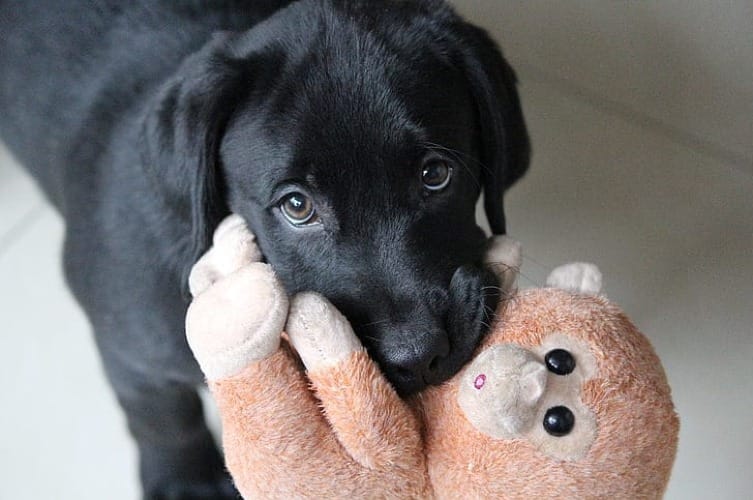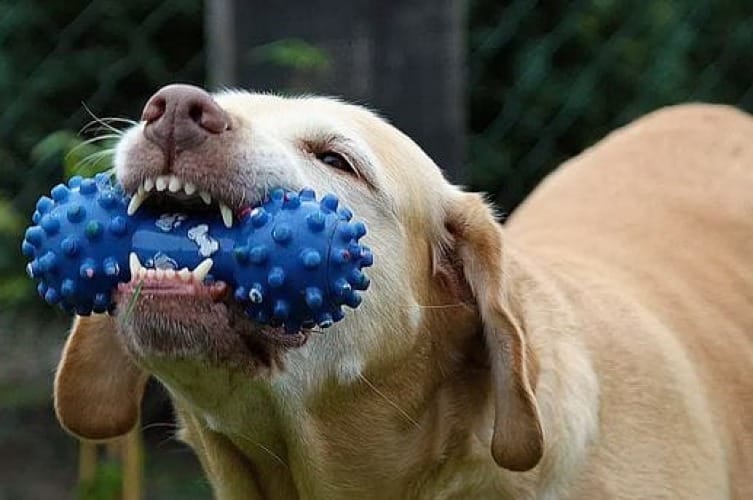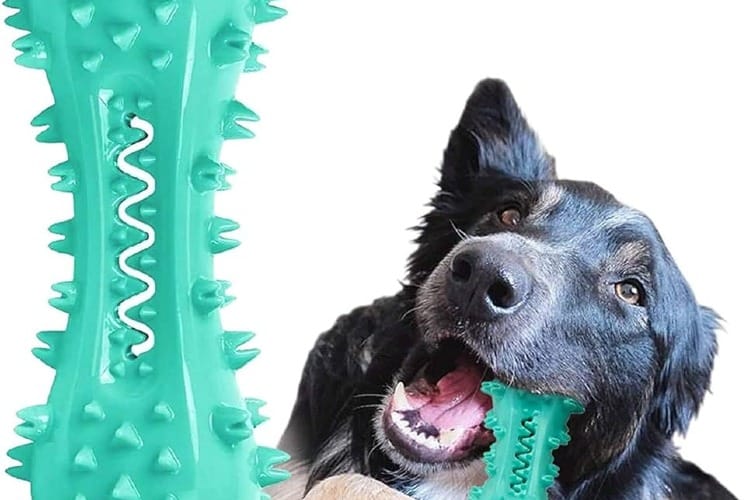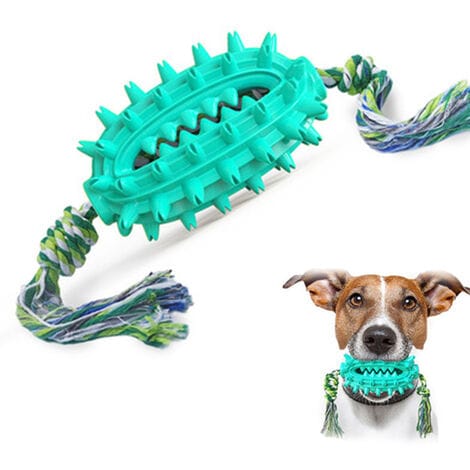Teething is a natural process that all puppies go through. During this time, puppies experience discomfort and pain as their teeth grow and develop. As a result, they have a tendency to chew on anything they can get their teeth on. This can be a problem for pet owners, as puppies may chew on furniture, shoes, and other household items. To prevent this, it is important to provide puppies with appropriate toys for teething.
Toys for teething puppies come in a variety of shapes and sizes. Some are made of rubber, while others are made of fabric or rope. The best toys for teething puppies are those that are durable, non-toxic, and easy to clean. They should also be designed to massage the gums and relieve pain associated with teething. Pet owners should avoid toys that are too hard or too small, as these can be dangerous for puppies.
When choosing toys for teething puppies, it is important to consider the age and size of the puppy. Smaller puppies may need softer toys, while larger puppies may require toys that are more durable. Additionally, pet owners should supervise their puppies when they are playing with toys, as some puppies may be prone to chewing and swallowing pieces of the toy. By providing appropriate toys for teething, pet owners can help their puppies through this difficult phase and protect their household items at the same time.

Understanding Puppy Teething
Puppy teething is a natural process that all puppies go through as they grow and develop. During this period, puppies start to lose their baby teeth and grow their adult teeth. This phase can be uncomfortable for puppies, but there are ways to ease their discomfort.
Stages of Teething in Puppies
The teething period in puppies typically lasts from three to eight months. During this time, puppies will go through several stages of teething. The first stage starts at around two to three weeks old when puppies start to develop their baby teeth. By the time they reach six to eight weeks old, they will have a full set of 28 baby teeth.
The second stage of teething begins at around three to four months old when puppies start to lose their baby teeth. They will begin to grow their adult teeth, which can cause discomfort as the teeth push through the gums. This process can take several months, and by the time they are seven to eight months old, they should have a full set of 42 adult teeth.
Signs of Teething
Puppies who are teething may exhibit several signs of discomfort. They may chew on anything they can find to alleviate their sore gums, including furniture, shoes, and toys. They may also drool more than usual, have inflamed gums, and even refuse to eat or drink.
To help ease their discomfort, provide your puppy with appropriate teething toys. These toys should be durable, safe, and designed to massage their sore gums. Frozen treats, such as carrots or apples, can also help soothe their gums.
In conclusion, understanding the stages of teething in puppies and recognizing the signs of discomfort can help pet owners provide the appropriate care for their furry friends. By providing appropriate toys and treats during the teething period, pet owners can help their puppies grow into healthy adult dogs.

Selecting the Right Teething Toys
Puppies love to chew, and teething toys are a great way to help them through the process of growing new teeth. However, with so many options available, it can be overwhelming to choose the right one for your furry friend. Here are some important factors to consider when selecting the right teething toys for your puppy.
Material and Durability
When it comes to teething toys, durability is key. Look for toys made from durable materials that can withstand the strong jaws of a teething puppy. Soft, malleable rubber toys are a popular choice, as they are gentle on a puppy's teeth and gums while still being strong enough to withstand chewing. Additionally, make sure the toy is made from non-toxic materials to ensure your puppy's safety.
Size and Breed Considerations
The size and breed of your puppy should also be taken into consideration when selecting a teething toy. A toy that is too small can be a choking hazard, while a toy that is too large may be difficult for a smaller breed to play with. Make sure to choose a toy that is appropriate for your puppy's size and breed.
Texture and Comfort
Different textures can provide different levels of comfort for your puppy's teething needs. Some puppies prefer softer toys, while others may prefer a harder texture to chew on. Experiment with different textures to see what your puppy enjoys most.
Safety and Supervision
It is important to always supervise your puppy while they are playing with a teething toy. Puppies can be curious and may try to swallow small pieces of the toy, which can be dangerous. Additionally, make sure to inspect the toy regularly for any signs of wear and tear, and replace it if it becomes too damaged.
By keeping these factors in mind, you can select the right teething toys for your puppy that will help them through the teething process while keeping them safe and happy.

Popular Teething Toy Options
Teething is a natural process for puppies, but it can be uncomfortable and painful. Providing them with appropriate teething toys can help soothe their gums and prevent them from chewing on inappropriate objects. Here are some popular teething toy options that can help your puppy during this phase.
Chew Toys for Soothing Gums
Chew toys are a great option for puppies who are teething. They provide a safe and durable surface for your puppy to chew on, which can help relieve the discomfort of teething. The Kong Puppy Binkie is a popular choice for teething puppies. It's made of soft rubber and has a unique shape that's perfect for chewing. Nylabone Puppy Chews are also a great option. They come in different flavors and textures, and they're designed to clean teeth and massage gums.
Interactive Toys for Mental Stimulation
Interactive toys are another great option for teething puppies. They provide mental stimulation and can help keep your puppy occupied. Puzzle toys are a popular choice. They come in different shapes and sizes, and they require your puppy to figure out how to get the treat inside. Petstages Cool Teething Stick is another interactive toy that's perfect for teething puppies. It can be frozen to provide a soothing sensation for your puppy's gums.
Edible Chews and Treats
Edible chews and treats are a tasty option for teething puppies. They provide a distraction from the discomfort of teething and can also help clean teeth. Benebone Wishbone is a popular choice. It's made of real bacon and nylon, and it's designed to be chewed on for a long time. Nylabone Puppy Chew Teething Pacifier is another great option. It's made of soft rubber and has a unique shape that's perfect for teething puppies. Flavored chew toys are also a great option. They come in different flavors and textures, and they're designed to be chewed on for a long time.
Teething Relief and Pain Management
Teething is a natural process for puppies, but it can be a painful and uncomfortable experience. Fortunately, there are several ways to help alleviate their discomfort and provide teething relief.
Home Remedies
One of the easiest and most cost-effective ways to provide teething relief is through home remedies. Frozen washcloths, for instance, can be a great way to soothe your puppy's sore gums. Simply wet a washcloth and freeze it for a few hours before giving it to your puppy to chew on. The cold temperature can help numb their gums and reduce inflammation.
Another home remedy that can provide teething relief is dog-safe peanut butter. Not only is it a tasty treat for your puppy, but the act of licking and chewing on it can help massage their gums and provide relief. However, it's important to make sure the peanut butter you use is specifically made for dogs and does not contain xylitol, which can be toxic to dogs.
Veterinary Solutions
If home remedies aren't enough to provide adequate teething relief, there are several veterinary solutions that can help manage your puppy's pain. Your veterinarian may recommend chew toys specifically designed for teething puppies, which can help massage their gums and promote healthy teeth development.
In some cases, your veterinarian may also prescribe pain medication to help manage your puppy's discomfort. It's important to follow their instructions closely and only use medication as directed.
In conclusion, providing teething relief for your puppy can be achieved through a combination of home remedies and veterinary solutions. By using safe and effective methods, you can help make the teething process more comfortable and enjoyable for your furry friend.

Training Puppies with Teething Toys
Teething is a natural process for puppies, but it can be a frustrating time for owners. Puppies often have an urge to chew on everything in sight, including shoes, furniture, and other items that can be costly to replace. Fortunately, there are teething toys designed specifically for puppies that can help redirect their chewing behavior.
Preventing Destructive Chewing
One of the best ways to prevent destructive chewing is to provide puppies with appropriate chew toys. Puppy chew toys are designed to be durable and safe for puppies to chew on. They come in a variety of shapes and sizes, so it's important to find a toy that is appropriate for your puppy's age and size.
Dog trainers recommend providing puppies with a variety of chew toys to prevent boredom. Puppies are more likely to chew on inappropriate items when they are bored or not stimulated. By providing a variety of toys, puppies are less likely to become bored and will be more likely to chew on appropriate items.
Encouraging Positive Play
Playing fetch is a great way to encourage positive play with puppies. It provides an opportunity for puppies to engage in physical activity and helps to strengthen the bond between puppies and their owners.
Another benefit of playing fetch is that it can help to clean puppies' teeth. Chewing on a ball or other toy can help to remove plaque and tartar buildup, which can lead to dental problems later in life.
It's important to remember that not all puppies are the same. Some puppies are aggressive chewers and may require more durable toys. If you have an aggressive chewer, it's important to find toys that are specifically designed for aggressive chewers.
Teething can be a frustrating time for both puppies and their owners. By providing appropriate chew toys and encouraging positive play, owners can help redirect their puppies' chewing behavior. Playing fetch is a great way to provide physical activity and help clean puppies' teeth. It's important to find toys that are appropriate for your puppy's age and size, and to provide a variety of toys to prevent boredom.
Care and Maintenance of Puppy Toys
Puppy toys are essential for teething puppies as they provide a safe and appropriate outlet for their chewing needs. However, it is important to properly care for and maintain these toys to ensure their longevity and safety for your furry friend.
Cleaning and Inspection
Regular cleaning and inspection of puppy toys are crucial for maintaining their hygiene and safety. Durable chew toys, which are designed to withstand heavy chewing, can accumulate bacteria over time and require frequent cleaning.
To clean puppy toys, it is recommended to use warm water and mild soap. Avoid using harsh chemicals or cleaning agents that can harm your puppy's health. Rinse the toy thoroughly and allow it to air dry before returning it to your puppy.
Inspect the toy regularly for any signs of wear and tear, such as frayed edges or loose parts. If the toy is damaged, it is best to replace it immediately to prevent any potential choking hazards.
Replacement and Rotation
Rotating and replacing puppy toys is important for keeping your puppy engaged and preventing boredom. It is recommended to have a variety of toys available, including different textures and shapes, to cater to your puppy's chewing needs.
Customer reviews can be a helpful resource when selecting puppy toys. Look for toys that have positive reviews for their durability and ability to clean teeth.
It is also important to replace toys that are no longer suitable for your puppy's age or size. As your puppy grows, their chewing needs will change, and they may require toys that are more challenging or appropriate for their size.
Proper care and maintenance of puppy toys are essential for ensuring their longevity and safety for your furry friend. Regular cleaning and inspection, as well as rotating and replacing toys, can help keep your puppy engaged and satisfied with their chewing needs.

Choosing Toys for Different Puppy Personalities
Active vs. Passive Puppies
When it comes to selecting toys for teething puppies, it is important to consider their personality. Some puppies are more active and playful, while others may be more passive and prefer to cuddle up with their owners. For active puppies, toys that are durable and can withstand rough play are ideal. Rope toys are a great option as they are sturdy and can be used for tug-of-war games. Squeaker toys are also a good choice as they can keep active puppies engaged and entertained for hours.
On the other hand, passive puppies may prefer softer toys that they can cuddle with. Plush toys are perfect for these types of puppies as they are soft and gentle on their gums. However, it is important to keep an eye on these toys and replace them if they become torn or damaged.
Toy Preferences Based on Personality
Each puppy has its own unique personality, and this can influence their toy preferences. For example, some puppies may be more interested in toys that challenge their minds and require problem-solving skills. Interactive puzzle toys are perfect for these types of puppies as they can keep them engaged and mentally stimulated.
Other puppies may prefer toys that provide comfort and security. Plush toys with a soft texture and soothing scent can help calm anxious puppies and provide them with a sense of security.
Choosing the right toys for teething puppies can be a daunting task. However, by considering their personality and preferences, owners can select toys that will keep their puppies happy, healthy, and entertained.
Advanced Teething Toy Features
Teething puppies need toys that can withstand their chewing habits and provide relief to their sore gums. Advanced teething toys offer a variety of features that can help puppies during this stage of their development.
Smart Toys and Technology
Some teething toys come with technology that can make them more interactive and engaging for puppies. For example, some toys may have sensors that activate when the puppy bites down on them, making a sound or vibrating to provide extra stimulation. Other toys may have lights or other features that can keep the puppy engaged and distracted from their teething discomfort.
Innovative Textures and Shapes
Teething puppies need a variety of textures to chew on to help relieve their discomfort. Advanced teething toys offer a range of textures, from smooth to rough, to provide different sensations for the puppy. Some toys also come in unique shapes that can help clean teeth and massage gums as the puppy chews.
Toys made of durable rubber are also a great option for teething puppies. These toys are designed to withstand the strong jaws and sharp teeth of puppies and can provide long-lasting relief from teething discomfort.
Conclusion
Overall, advanced teething toys offer a range of features that can help puppies during the teething stage. With a textured surface, variety of textures, durable rubber, and the ability to be stuffed or float in water, these toys can provide hours of entertainment and relief for teething puppies.

Tips for Pet Parents
Teething is a natural process for puppies, but it can be a challenging time for pet parents. Here are some tips to help you through this stage:
Supervising Playtime
It's important to supervise your puppy during playtime, especially when they are teething. This will ensure they don't accidentally ingest any toys or chew on inappropriate items. It's recommended to have a designated play area for your puppy, and to keep an eye on them at all times.
Understanding Your Puppy's Needs
Puppies have a natural urge to chew during the teething process, as it helps to relieve discomfort and soothe their gums. Providing appropriate toys for your puppy to chew on is essential. Look for toys specifically designed for teething puppies, such as rubber toys or toys with ridges and bumps. It's also important to rotate toys regularly to keep your puppy interested and engaged.
In addition to providing appropriate toys, it's important to ensure your puppy is getting enough exercise and mental stimulation. This will help to prevent destructive chewing behavior and keep your puppy happy and healthy.
By following these tips, pet parents can help their teething puppies through this challenging stage and ensure their overall well-being.
Conclusion:
In conclusion, the teething phase is a pivotal period in a puppy's development that requires careful attention and support from pet owners. By understanding the signs of teething discomfort and offering a variety of appropriate teething toys, owners can significantly alleviate their puppy's discomfort. It's essential to choose toys that are safe, durable, and designed to soothe sore gums, while also keeping the puppy's size and chewing behavior in mind.
Regular supervision and maintenance of these toys ensure safety and prevent the ingestion of toy parts. Additionally, incorporating simple home remedies and seeking veterinary advice when necessary can offer further relief to teething puppies. Through these efforts, pet owners can help their puppies through the teething process, fostering healthy chewing habits and contributing to their overall well-being and development into adulthood.
FAQs
- What are the signs that my puppy is teething?
- Teething puppies may chew more frequently on various objects, drool more than usual, show signs of gum inflammation, and in some cases, may even refuse food or water due to discomfort.
- How long does the teething phase last for puppies?
- The teething phase typically begins around 2-3 weeks of age with the emergence of baby teeth and continues until about 7-8 months of age when most puppies will have their full set of adult teeth.
- What types of toys are best for teething puppies?
- Ideal teething toys for puppies are durable, made from non-toxic materials, easy to clean, and designed to massage the gums and relieve teething pain. Avoid toys that are too hard or too small to prevent any risk of injury or choking.
- Can I give my teething puppy frozen treats?
- Yes, frozen treats like carrots or apples can be soothing for teething puppies' gums. However, ensure any treat given is safe for puppies and does not pose a choking hazard.
- How can I prevent my teething puppy from chewing on inappropriate items?
- Providing a variety of suitable teething toys, supervising your puppy, and redirecting their chewing behavior towards appropriate items can help prevent them from chewing on inappropriate objects. Regular exercise and mental stimulation are also key in deterring destructive chewing behavior.




